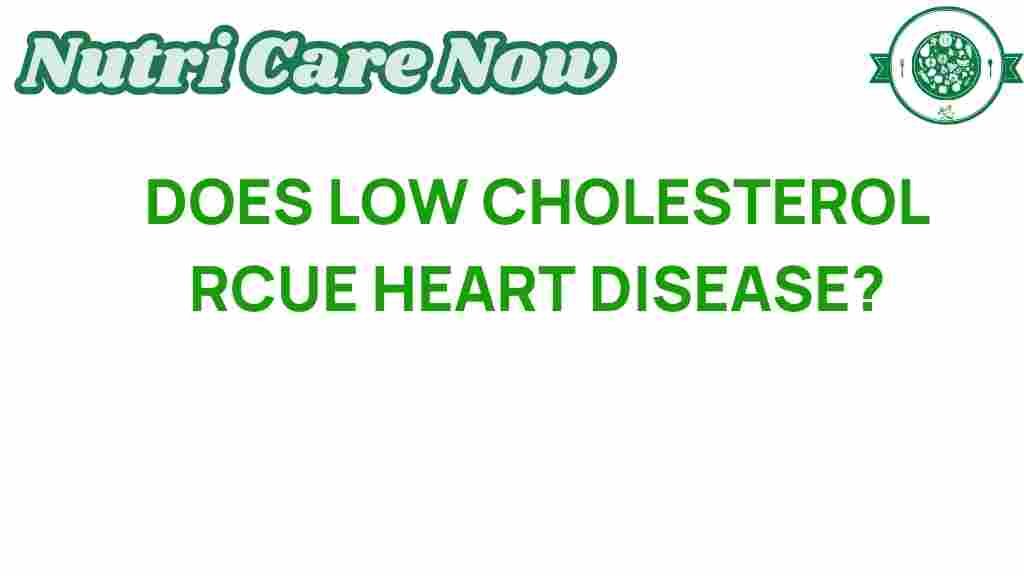Does Low Cholesterol Really Reduce Heart Disease Risk?
Cholesterol has long been a topic of debate among health professionals and the general public. With heart disease being one of the leading causes of death worldwide, understanding the role of cholesterol in cardiovascular health is crucial. Many people believe that having low cholesterol levels is synonymous with a lower risk of heart disease. However, the relationship between cholesterol, heart disease, and overall health is more complex than it seems. In this article, we will explore the myths surrounding cholesterol, its impact on heart disease risk, and how diet and nutrition can play a pivotal role in prevention.
Understanding Cholesterol
Cholesterol is a waxy substance found in your blood. It is essential for building healthy cells, but high levels of certain types of cholesterol can increase your risk of heart disease. Cholesterol travels through your bloodstream in two main forms:
- Low-Density Lipoprotein (LDL): Often referred to as “bad” cholesterol, high levels of LDL can lead to plaque buildup in your arteries, increasing the risk of heart disease.
- High-Density Lipoprotein (HDL): Known as “good” cholesterol, HDL helps remove LDL cholesterol from the arteries, reducing heart disease risk.
The balance between these two types of cholesterol is vital for maintaining cardiovascular health. While it’s commonly believed that lower total cholesterol levels automatically equate to lower heart disease risk, this is not entirely accurate.
Cholesterol and Heart Disease Risk Factors
Heart disease risk is influenced by a variety of factors. While cholesterol levels are important, they are just one piece of the puzzle. Other significant risk factors include:
- Diet: A diet high in saturated fats and trans fats can raise LDL cholesterol levels, while a diet rich in fruits, vegetables, whole grains, and healthy fats (like avocados and nuts) can improve cholesterol levels.
- Physical Activity: Regular exercise can help raise HDL cholesterol and lower LDL cholesterol, contributing to overall heart health.
- Smoking: Tobacco use can lower HDL cholesterol and increase the risk of heart disease.
- Obesity: Being overweight or obese can contribute to high cholesterol levels and other risk factors for heart disease.
- Genetics: Family history can play a significant role in cholesterol levels and heart disease risk.
- Diabetes: Having diabetes is a significant risk factor for heart disease, often associated with higher LDL and lower HDL levels.
The Role of Diet and Nutrition
Nutrition plays a crucial role in managing cholesterol levels and reducing heart disease risk. Here are some dietary recommendations that can help:
- Increase Fiber Intake: Foods high in soluble fiber, such as oats, beans, lentils, and fruits, can help lower LDL cholesterol levels.
- Choose Healthy Fats: Replace saturated and trans fats with unsaturated fats found in olive oil, fish, nuts, and avocados.
- Limit Processed Foods: Processed foods often contain unhealthy fats and sugars that can negatively impact cholesterol levels.
- Incorporate Omega-3 Fatty Acids: Fatty fish like salmon, mackerel, and sardines are rich in omega-3 fatty acids, which can improve heart health.
Myths About Cholesterol and Heart Disease
There are several myths surrounding cholesterol and its impact on heart disease. Understanding these myths can help you make informed decisions about your health:
- Myth 1: All cholesterol is bad.
Fact: Cholesterol is essential for various bodily functions, and HDL cholesterol is beneficial for heart health. - Myth 2: Low cholesterol means low heart disease risk.
Fact: Very low cholesterol levels can also pose health risks and do not guarantee protection against heart disease. - Myth 3: Only people with high cholesterol need to worry about heart disease.
Fact: Heart disease can affect individuals with normal cholesterol levels, particularly if other risk factors are present.
Step-by-Step Process to Manage Cholesterol Levels
Managing cholesterol levels and reducing heart disease risk involves a comprehensive approach. Here’s a step-by-step process you can follow:
- Get Regular Check-Ups: Regular blood tests can help monitor your cholesterol levels and overall cardiovascular health.
- Adopt a Heart-Healthy Diet: Focus on a balanced diet rich in fruits, vegetables, whole grains, and healthy fats.
- Engage in Physical Activity: Aim for at least 150 minutes of moderate aerobic exercise per week to help manage weight and cholesterol levels.
- Avoid Smoking: If you smoke, seek help to quit, as this can significantly improve heart health.
- Manage Stress: Incorporate stress-reducing activities such as yoga, meditation, or hobbies that relax you.
- Consult with Healthcare Professionals: Work with your doctor or a nutritionist to create a personalized plan that addresses your specific needs.
Troubleshooting Tips
If you find it challenging to manage your cholesterol levels or reduce heart disease risk, consider these troubleshooting tips:
- Educate Yourself: Understanding nutrition labels and the impact of different foods can empower you to make healthier choices.
- Plan Your Meals: Meal prepping can help you stick to a healthy diet and avoid unhealthy options when you’re short on time.
- Find a Support System: Join a group or find friends who are also focused on improving their health. Sharing experiences can provide motivation.
- Limit Alcohol: Excessive alcohol consumption can negatively affect cholesterol levels and overall heart health.
Conclusion
The relationship between cholesterol and heart disease is complex, and while low cholesterol levels are generally associated with a lower risk of heart disease, it is essential to consider other factors such as diet, lifestyle, and genetics. Focusing on a balanced diet, regular exercise, and avoiding harmful habits can significantly contribute to heart health. Remember that cholesterol is just one of many risk factors for heart disease. To learn more about heart disease prevention, visit the American Heart Association.
In summary, while managing cholesterol levels is vital, it should be part of a holistic approach to cardiovascular health. By debunking myths and understanding the broader context of heart disease risk factors, you can take proactive steps toward a healthier heart.
This article is in the category Health and created by NutriCareNow Team
